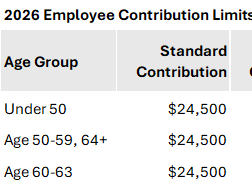The average retirement age in America hovers in the low- to mid-60s. But averages mean very little if you’re a high achiever.
You’ve spent decades running at full tilt — building companies, climbing corporate ladders, or shaping industries. Should you stop at 62 just because that’s when most people do? Or keep going while your career (and income) is at its peak?
As you’ve probably figured out already, there is no universal “best” retirement age. The right age depends on a mix of factors: your finances, your health, and maybe most importantly, your appetite for what comes next.
| Let’s walk through these retirement planning factors, so you can start to pinpoint a more tangible timeline. |
The Traditional Benchmarks of Retirement Age
For decades, a few ages have served as the unofficial markers of retirement. They’re not mandatory, by any means, but they’ve shaped how most people think about timing their exit.
62 Years Old: Early Retirement.
This is the earliest you can claim Social Security benefits, which makes it a tempting option. Claiming early means does lock in a reduced monthly benefit though — sometimes for the rest of your life. For high achievers who’ve spent years building financial security, the trade-off may or may not be worth it.
65 Years Old: Medicare Eligibility.
For many retirees, healthcare is the single biggest expense. Age 65 is the point when Medicare kicks in, which can drastically reduce insurance costs. Retiring before this age often means bridging the gap with private health insurance, which can be costly.
66–67 Years Old: Full Retirement Age.
The Social Security Administration defines your “full retirement age” (FRA) based on your birth year. For most people approaching retirement today, that’s somewhere between 66 and 67. Waiting until FRA ensures you’ll receive your full Social Security benefit — no reduction for early claiming.
For couples, this can also set the stage for maximizing spousal or survivor benefits.
70 Years Old: Maximum Social Security.
Delaying Social Security until age 70 can increase your monthly benefit by as much as 8% per year after FRA. For those in good health with strong retirement savings, this strategy can create a larger, more reliable income stream later in life.
That said, these retirement benefit benchmarks don’t tell the whole story. They’re isolated factors. They’re driven by averages, rules, and government programs — not your specific financial picture or life goals.
And for high achievers, those goals tend to look very different.
Why High Achievers Retire Differently
Historically, retirement has been treated as a full, sudden stop. Except, for many high-achieving, ambitious professionals, the idea of stepping away entirely isn’t very appealing.
Perhaps you’ve built a business, developed new products or services, or led at the top of your field. The decision to “retire” doesn’t center on money alone. It’s also a question of identity and the desire to keep pushing forward, even if in a different direction.
Some choose to retire early because financial independence gives them the freedom to pivot. They may trade 60-hour workweeks for part-time consulting, advisory board seats, or philanthropic ventures. Others delay retirement, not because they need the paycheck, but because they thrive on the challenge and social interaction their career provides.
And then there’s the growing middle ground: professionals who desire a second act. That could be mentoring the next generation of entrepreneurs. Or launching a new venture, pursuing creative passions, or doubling down on family and community.
In other words, the “ideal retirement age” for high achievers isn’t measured in years. It’s measured in readiness — financial, physical, and emotional.
Financial Factors That Impact Your Best Retirement Age
While the retirement transition is not black and white, the math behind your personal finances is important nonetheless. The timing of retirement still hinges on whether your finances can carry the lifestyle you want for the next 20–30 years. Here are the main financial considerations.
Savings and Withdrawals
A healthy portfolio isn’t solely measured by the size of the account alone, but by what it can sustainably provide year after year. If you expect to spend $250,000 annually in retirement, you’ll need different withdrawal strategies than someone living on $120,000. Tools like Monte Carlo simulations and stress tests can project whether your savings will hold up against market volatility and inflation.
Income Sources
Most retirees draw from a mix of Social Security, retirement accounts, and taxable brokerage accounts. The sequence matters: tapping a 401(k) too early could mean higher taxes, while coordinating Roth IRA withdrawals later can preserve flexibility. For Bay Area professionals with significant equity compensation, a well-timed liquidation plan can be the difference between tax headaches and long-term security.
Taxes
Every retirement decision runs through the IRS. Retiring while your income is still high — perhaps after an IPO or business sale — could push you into the top bracket. On the other hand, spacing out large events, or converting traditional IRA assets to Roths in lower-income years, may create significant lifetime savings.
Portfolio Design
Investment allocation sets the tone for your retirement. A concentrated equity position may serve you well in growth years, but it also magnifies risk if markets stumble early in retirement (subjecting you to sequencing risk). A blend of growth and income assets can provide both upside potential and the resilience to weather downturns.
Together, these financial factors sketch out the outer limits of when retirement is viable. Even so, the “right” age still depends on how these numbers intersect with your health, your family, and the kind of life you want in your next chapter.
How Healthcare and Lifestyle Factor into Retirement
Financial readiness is only one part of the equation. Health and lifestyle should weigh just as heavily in determining the right retirement age.
Healthcare Access
Medicare eligibility begins at 65. Retiring earlier means covering the gap with private insurance — a cost that can run into the tens of thousands annually for Bay Area families. Even after 65, out-of-pocket expenses for supplemental coverage, prescriptions, and long-term care can significantly impact retirement budgets.
Health and Longevity
If you’re in good health with a family history of longevity, delaying retirement may allow you to extend both your earning years and your Social Security benefits. On the other hand, retiring earlier might give you the chance to enjoy more active years to travel, hike, or pursue other passions.
Lifestyle Goals
What pace of life do you want to live post-career? Do you plan to continue at a high intensity — consulting, launching a venture, or mentoring — or transitioning into part-time work and leisure? Your energy level and desired commitments should inform your timing just as much as your finances.
Mental Health and Social Connection
Work often provides structure, identity, and community. Retiring too soon without a plan to replace those anchors can lead to isolation or lack of purpose. Designing a second act — whether through volunteering, board service, or creative pursuits — can help ensure your retirement years feel just as fulfilling and invigorating as your career.
5 Questions to Help You Conceptualize Life After Work
How much exactly is enough money? It’s natural to set your sights on a specific dollar figure, but oftentimes the more important, decision-driving questions are qualitative. Take some time answering the following questions to help assess your priorities and conceptualize your Life After Work goals:
1. What excites you most about retirement?
Is it the ability to slow down and enjoy leisure time, or the opportunity to explore new projects?
We’ve worked with clients who can’t wait to swap red-eye flights for trips with their family, while others look forward to finally launching a small venture they’ve shelved for years.
2. Do you see yourself continuing to work in any capacity?
If so, for how long? Will this be a short-term transition or a longer, more permanent part of retirement?
Perhaps you’ve found a successor at your company and are ready to scale back to part-time consulting, earning less but still keeping a seat at the table.
3. What milestones or signals will indicate it’s time to transition to another phase of retirement?
A specific age? A financial target? Declining interest in your work?
Sometimes it’s entirely unrelated — such as once your youngest graduates college.
4. What personal fulfillment or sense of purpose do you need to feel engaged in retirement?
Will you seek structured activities like board service, teaching, or entrepreneurship? Or do you prefer unstructured personal projects?
Some retirees thrive on the structure of serving on multiple nonprofit boards. Others find purpose in restoring a vintage car, joining a hiking group, or investing time in grandkids.
5. How will your lifestyle shift over time?
Will you maintain the same level of spending in your 70s and 80s, or will you gradually shift toward lower-cost living?
Early retirement years might be travel-heavy (e.g., business class flights, second homes, big adventures). Later decades may naturally shift toward fewer expenses, with more emphasis on healthcare and family support.
| Regardless, these are open-ended questions that can change over time, but they should start to guide you in a direction. |
How a Financial Advisor Helps Define Your Ideal Retirement Age
You may have your entire life mapped out in a pristine, macros-powered spreadsheet. Even so, as prepared and detailed as you may be, narrowing down the best time or best age to retire is not a simple exercise to do alone.
The right advisor can bring clarity to this complex decision by combining technical expertise with the kind of perspective that only comes from years of guiding others through the same transition.
They can model the trade-offs of retiring at 62, 65, 70, or whatever age or timeline you desire, accounting for variables like retirement income, life expectancy, withdrawals, and taxes. They’ll stress test your portfolio against the unexpected, from a market crash to sudden healthcare costs, so you know how resilient your plan really is.
Just as importantly, they help connect the numbers to your life outside of work: aligning your timeline with how you want to spend your 50s, 60s, 70s, and beyond.
In our experience, the tougher part of retiring is arguably stepping back from the identity and momentum of your career. A good advisor becomes a sounding board in those moments — helping you move forward with confidence that both your finances and your future are in sync.
The Bottom Line
There’s no single “best” retirement age. The right time depends on your finances, your health, and the vision you have for your next chapter. For high achievers, that decision can feel even more complex — but also more full of possibility.
The good news: you don’t have to figure it out alone. With the right financial planning and a trusted sounding board, you can step into retirement — or Life After Work — with clarity and confidence.
Ready to explore what the right retirement age looks like for you? Schedule a free meeting with BEW today.
Get the BEW Newsletter Direct to Your Inbox
Stay informed with timely perspectives and market insights from the BEW Invest team.


